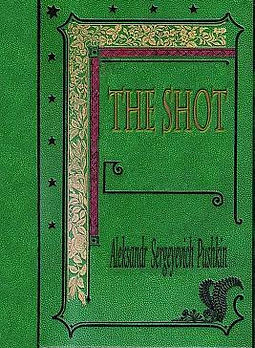

The first story in The Belkin Tales, The Shot tells of a retired soldier named Silvio and his quest for revenge against the Count. The setting is split between a rural military outpost and the Count's country estate. Through an unknown narrator, a soldier in the nearby barrack, the reader learns that Silvio was once challenged to a duel but refused to shoot his opponent, the Count, because he was eating cherries and clearly did not value life in the way Silvio did. Since then, Silvio has been planning his revenge on the Count. Several years later, the narrator visits his neighbors in the countryside and learns that he and his neighbor, the Count, have a mutual acquaintance in Silvio. As the two men exchange stories, the narrator and thus the reader learn that Silvio did indeed exact his revenge by terrorizing the Count and his new wife. Instead of shooting the Count, Silvio shot at a portrait in almost exactly the same spot that the Count had shot. This satisfies Silvio and terrifies the Count into valuing his life because this proves how easily Silvio could have killed the Count but chose not to. This story is said to be very autobiographical of Pushkin himself, as he was quite fond of dueling and known to be a brash gambler and drinker.
Full text: http://gaslight.mtroyal.ab.ca/TheShot.htm
The Shot
Вы́стрел

This story is also part of the Belkin Tales, and is told through the perspective of a traveler. It details the life of a stationmaster in provincial Russia and his daughter Dunya. After a visit to the station by a Hussar captain, Dunya leaves with the captain to go to Saint Petersburg, either kidnapped by the captain or on her own free will out of love for him. This leaves the stationmaster in misery and alocholism, as he is very dependent on Dunya, and the station itself also falls to shambles. The stationmaster unsuccessfully tries to visit Dunya in Saint Petersburg, but she never makes any attempt to visit him in his lifetime. The stationmaster dies and Dunya does come to visit his grave with her children and all the attributes of a lavish lifestyle, showing that the Hussar did not just kidnap Dunya and then abandon her. This story details much about familial honor and duty in Russian society and the intelligence of women and their desire to see the world. It is also an inversion of the bibilical tale of the Prodigal Son.
Full Text: http://www1.umn.edu/lol-russ/hpgary/Russ1304/Readings/STATION.HTM
The Stationmaster
Станцио́нный смотри́тель

This story is about the obsession of a German officer, Hermann, with the secret to winning to winning the card game Faro. He learns that an elderly Countess holds this secret after having learned it from Count Saint-Germain, and tries to learn this secret by seducing her young maid Lizaveta. When he tries to get the secret out of the Countess, he draws his gun in an effort to threaten her, and she dies of fright. Later, the ghost of the Countess comes to Hermann and tells him that the three secret cards needed to win are three, seven, and ace, played in that order. However, in his third night playing cards Hermann believes he has bet on the ace when he has actually bet on the Queen of Spades. The Queen of Spades has a strange resemblance to the Countess. He loses the game and thus all his money. In the end, the reader learns that Hermann goes mad and is admitted to an asylum, where all he can think about is the three cards. This story tells a lot about the gambling culture of Russia and has much biblical symbolism related to numbers. It also is a mix between realism and romanticism, or supernatural ideas.
Full Text: http://www.gutenberg.org/etext/23058
The Queen of Spades
Пиковая дама
Featured Works
List of works
Narrative Poems:
-
1820 – Ruslan and Ludmila
-
1820–21 – The Prisoner of the Caucasus
-
1821 – The Gabrieliad
-
1821–22 – The Robber Brothers
-
1823 – The Fountain of Bakhchisaray
-
1824 – The Gypsies
-
1825 – Count Nulin
-
1829 – Poltava
-
1830 – The Little House in Kolomna
-
1833 – Angelo
-
1833 – The Bronze Horseman
-
1825–1832 (1833) – Eugene Onegin
Drama:
-
1825 – Boris Godunov
-
1830 – The Little Tragedies
-
The Stone Guest
-
Mozart and Salieri
-
The Miserly Knight
-
A Feast in Time of Plague
-
Prose:
-
1828 – Peter the Great's Negro, unfinished novel
-
1831 – The Tales of the Late Ivan Petrovich Belkin
-
The Shot
-
The Blizzard
-
The Undertaker
-
The Stationmaster
-
The Squire's Daughter
-
-
1834 – The Queen of Spades
-
1834 – Kirdzhal
-
1834 – A History of Pugachev, study of the Pugachev's Rebellion
-
1836 – The Captain's Daughter
-
1836 – A Journey to Arzrum
-
1836 – Roslavlev, unfinished novel
-
1837 – The Story of the Village of Goryukhino, unfinished short story
-
1837 – Egyptian Nights, unfinished short story
-
1841 – Dubrovsky, unfinished novel
Fairy Tales:
-
1825 – The Bridegroom
-
1830 – The Tale of the Priest and of His Workman Balda
-
1830 – The Tale of the Female Bear
-
1831 – The Tale of Tsar Saltan
-
1833 – The Tale of the Fisherman and the Fish
-
1833 – The Tale of the Dead Princess
-
1834 – The Tale of the Golden Cockerel

